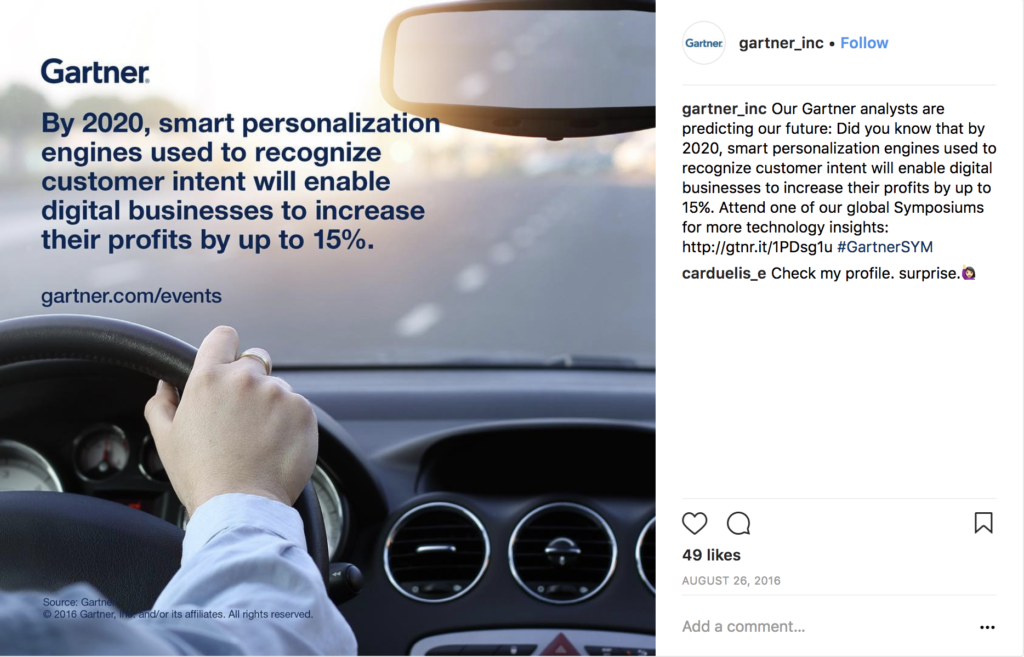What is personalised content?
The Content Marketing Institute defines personalised content as: “Content personalisation is a strategy that exploits visitor or prospect data to deliver relevant content based on the interests and preferences of the target audience.”
It is a strategy that both brands and publishers have been using for decades but as data collection has become more sophisticated and technology has advanced — including smarter attribution, tagging and automation — personalising content has become easier in many ways.
Content personalisation examples
There are few brands that truly put their audience at the heart of their products and employ a number of different types of content personalisation. Netflix, Amazon and Spotify are just a handful of brands who do. Let’s take a look at some tactics they use.
Netflix are one of today’s most popular content personalisers. They use recommendations to surface content relevant to their target audience. That’s over 125 million worldwide members. They do this to create a user experience that is intuitive, fun and meaningfully helps members find and enjoy stories on the platform as fast as possible. Ultimately, they know that if they don’t capture their audience’s attention within 90 seconds than they’ll lose interest. This is also why they employ data-driven decisions to keep their users engaged. Example: suggestions for what you should watch next.
Another example of content personalisation is Amazon’s continual A/B testing. They use artificial intelligence (AI) and automation to improve their conversion rates, resulting in an overall increase in sales. These tests can be anything from copy and images to pricing, product variations and calls to action — all tailored to an individual’s experience of their site. Their A/B tests, as well as increasing conversions and sales, have also led to real-time price optimisation — directly relating to return on investment.
Our final example is from one of the leaders in content personalisation, Spotify. Their ‘Discover Weekly’ playlist is a data-curated playlist of tracks, one for each of over 70 million members. The platform determines an individual ‘taste profile’, based on listening behaviour and popular playlists similar to their most listened to tracks. It’ll suggest tracks that people haven’t listened to but are similar — this now extends to videos and podcasts. Spotify also cleverly updates Discover playlists once a week and then deletes them, creating a sense of urgency and additional value for their service.
What is the difference between content personalisation and targeting?
One is helpful to marketers to target groups and the other is useful to customers because it targets them individually.
Targeting is helpful to marketers as it gives us better tools and insights to reach audiences we want to advertise to. It allows us to ‘bucket’ groups of people and show them more relevant content. This isn’t as customer-centric as personalisation, as it’s targeting within groups not individuals.
While targeting doesn’t account for individual intent, personalisation does. Personalisation is useful for customers as it provides real-time suggestions based on their needs. It is directly informed by the individual’s behaviour. This often means using machine learning algorithms and personalised automation to determine what content a customer is interested in at that moment.
Why should I care about content personalisation?
By knowing what your customers want, you can better engage them with specific products and content faster.
Personalised marketing increases your return on investment and increases brand preference. Research from Econsultancy found that 93% of companies see an increase in conversion rates from using personalisation because they had successfully provided what their customers were looking for.
Not only does personalisation directly impact the bottom line, it increases the likelihood of customer engagement. This means you meet customer expectations continually — boosting brand preference.
What is the future of content personalisation for brands?
The future of personalised content will be much more automated. The ability to respond quickly and helpfully to ‘in the moment’ customer behaviour will be vital as people become more demanding and tech savvy.
Marketing technology companies will provide customer journeys filled with content automatically optimised and personalised for each customer — reducing the reliance on in-house specialists.
As we pointed out in a previous blogpost — by 2020 over half of all searches will be spoken, rather than typed. And personalisation will be used to inform the results that are displayed.
Machine learning will also offer a valuable lifeline that will let brands continually test content and its placements in a simple, effective way that delivers directly on revenue. 97% of business leaders feel the future of marketing will consist of clever human marketers working in collaboration with machine learning-based entities.
One thing is for certain, the revolution will be personalised. Let’s just hope it’s also GDPR appropriate.
Get in touch if you’re keen to use a content personalisation strategy to boost your marketing return on investment.
For more of our latest content, enter your email below and sign up to our newsletter Brilliant Reads.
[hubspot type=form portal=5554216 id=df2ee318-4743-440e-affe-dd29663432b5]

